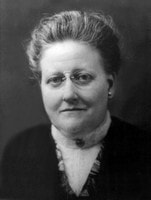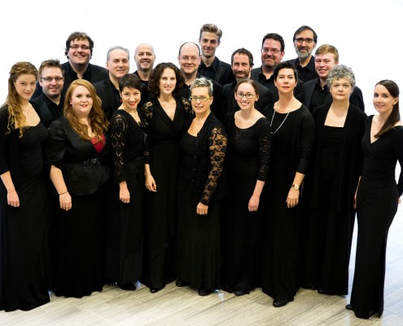 Sara Teasdale (1884-1933)
Sara Teasdale (1884-1933) My setting of Spring Night is performed here by a vocal quartet from Pro Coro Canada, Michael Zaugg conducting.
© Colin Eatock 2020
| Dr. Colin Eatock, composer |
|
 Sara Teasdale (1884-1933) Sara Teasdale (1884-1933) Sara Teasdale’s poetry is personal, subjective and often often confessional in tone, and frequently explores such issues as love, beauty and death. Spring Night is no exception: here, she contemplates natural beauty – admiring it, while also reflecting that she finds it no antidote for the sadness that love can bring. My setting of Spring Night is performed here by a vocal quartet from Pro Coro Canada, Michael Zaugg conducting. © Colin Eatock 2020
7 Comments
 The changes begin. The changes begin. My piece for cello and piano entitled Canterbury is based on a four-bell change-ringing pattern of the same name. Four “bells” (represented by four piano chords) are presented in all possible groupings – while the cello plays long, lyrical phrases that rise to a high C and descend to the instrument’s lower range. It is performed in this video by two Montreal-based musicians: cellist Dominique Beauséjour-Ostiguy and pianist Marie-Pier Allard. © Colin Eatock 2020  Amy Lowell. Amy Lowell. Amy Lowell (1874-1925) was born into a prosperous Massachusetts family. A poet, critic and biographer, she was a leading exponent of the imagist movement, and was for a time closely allied with Ezra Pound. Her obituary stated, "She was upon the surface of things a Lowell, a New Englander and a spinster. But inside, everything was molten like the core of the earth.” In 1926, she was posthumously awarded a Pulitzer Prize. Some of Lowell’s poetry was written for or about the actress Ada Dwyer Russell, with whom Lowell shared a “Boston marriage” (a 19th-century euphemism for a lesbian relationship) for more than a decade. I have chosen three of Lowell’s love poems – Absence, Vintage and The Giver of Stars – for this set of choral songs. All three are concise and emotionally intense; vivid yet elegant in their imagery. And I am pleased to present this “virtual video,” created (in this time of Covid-19 lockdown) by members of Seattle’s Byrd Ensemble. © Colin Eatock 2020  Jenny Lind Island: 68°43′N 101°58′W. Jenny Lind Island: 68°43′N 101°58′W. Some great musicians have had statues erected in their honour. Some have concert halls and music conservatories named after them. Still others are memorialized on postage stamps and in street-names. But how many can lay claim to an island in the Canadian Arctic? According to the good folks at Wikipedia, Jenny Lind Island is “a small island 420 km2 (160 sq mi) in the Kitikmeot Region of Nunavut, Canada. The island is located in the Queen Maud Gulf, about 120 km (75 mi) southeast of Cambridge Bay.”  No skiing for me in Banff this winter! No skiing for me in Banff this winter! Pride is a tricky business: you want to get it just right. If a person has too much pride, that is not a good thing. Such a person is often seen as arrogant and boastful. Also, too much pride can lead one to overestimate one’s ideas, abilities and accomplishments. There are plenty of cautionary stories about people whose pride was excessive. Icarus had too much pride, and things didn’t end well for him. “Pride goeth before destruction,” the Bible tells us.  Krishan Oberoi leads the Analog Chorale. Krishan Oberoi leads the Analog Chorale. Lately, I’ve found that my hermetically sealed bubble-world of classical music has been colliding with other musical worlds that exist well beyond the borders of my knowledge – and often with fascinating results. If you asked me three days ago who Justin Vernon was, or if I’d ever heard of a band called band Bon Iver, or their album 22, A Million, I’d have come up blank on all three questions. But I now know that Vernon is a singer-songwriter from Wisconsin, whose music simultaneously draws on folk, indie, electronica and hip-hop genres, among others. Bon Iver, one of several bands he fronts, released 22, A Million in 2016.  The Studio de Musique Ancienne de Montréal The Studio de Musique Ancienne de Montréal On Monday, I took in the Studio de Musique Ancienne de Montréal’s concert, at the University of Toronto’s Walter Hall. The program was presented within the Toronto Summer Music Festival’s offerings. At this point, I should perhaps “disclose” that I’m a friend of SMAM’s music director, Andrew McAnerney. I met him when I was living in London, about a dozen years ago, in a student residence where we were both living, with the peculiar name of Goodenough College. We’ve stayed in touch over the years. And after Monday’s concert, we went for a drink at a local pub.  During elections, candidates sometimes announce they are “suspending their campaigns,” which sounds a little softer than saying they are “giving up” or “throwing in the towel.” And it also leaves the door open just a crack, to permit the possibility that they might some day re-emerge in the political arena. In a similar spirit, I would like to announce that I am suspending my activities as a music critic. For more than three decades, I’ve written for various newspapers, magazines, websites, and for my own blog, “Eatock Daily” (which you are now reading). But for the last year or so I’ve been wondering if I really want to continue reviewing concerts and writing about music.  Proofessionalism: it's all about the shirt and tie. Proofessionalism: it's all about the shirt and tie. If you’re a composer and you tell a non-musician friend that you’ve been asked to write a new composition by a performing ensemble, the friend may ask, “When and where will this new piece be performed?” Tell another composer the same news, and the composer may ask, “How did you get the commission?” And if you show a non-musician friend the new CD of your music that’s just been released, the friend may ask you, “What does this music sound like?” Show it to a performing musician, and the performer will immediately flip it over to check the credits, to see which musicians recorded the disc.  Penelope (Mireille Lebel) is beset with suitors in the Return of Ulysses. Penelope (Mireille Lebel) is beset with suitors in the Return of Ulysses. For most of its 35 years, Opera Atelier has maintained a remarkable consistency in its high artistic standards. And a happy by-product of this state of affairs is the fact that the Toronto’s “period” baroque opera company has built up a substantial repertoire of productions worthy of re-mounting. One of these is Monteverdi’s Return of Ulysses, which returned to the Elgin Theatre this month, eleven years after it received its OA premiere. And while eleven years may seem like a long time to wait, it’s worth remembering that poor Penelope had to wait much longer for her Ulysses to return to her. That, of course, is the kernel of the story that composer Claudio Monteverdi and his librettist Giacomo Badoaro told in their opera of 1640: Ulysse’s struggles to find his way back to Ithaca from the Trojan War, and Penelope’s struggles to fend off an increasingly bold gang of suitors until he does. |
Eatock Daily
I'm a composer based in Toronto – and this is my classical music blog, Eatock Daily. Archives
March 2024
Index
Click here for an alphabetical list of blog entries.
|